In Vietnam and Cambodia, there is a French chain of hotels and resorts that strive to do what they can to operate responsibly within the environments in which they operate. Mallika Naguran finds out from the general manager Eric Simard just how Victoria Hotels & Resorts maintain their social and environmental responsibilities.
1. How has Victoria Hotels & Resorts changed over the years in terms of its environmental involvement and contribution since the establishment of the yearly Green Day began in 2004?
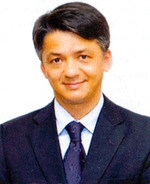
Eric Simard: We are part of the environment.
Victoria Hotels & Resorts has always been conscious of the fact that we are part of the environment and that we must become involved to safeguard and improve on it. The initial Green Day has done its part in raising environmental awareness both within the local communities as well as within the respective hotels. But this annual event is only the base from which we need to expand and move on. Since the first edition, we have implemented various actions to increase our environmental involvement. According to the locations, these measures have different forms.
In Phan Thiet, we collect rubbish on the beach on a daily basis, on our property, but also in the surroundings. All our hotels have a Green Committee that follows up environmental issues, such as energy saving and recycling: for instance, we use electric saving light bulbs and ask our suppliers to use recycling containers instead of plastic bags. We pay more attention to the choice of products used for each renovation (bamboo / recycling wood). In Angkor, the “Big Sit” will take place: this bird-watching event draws awareness to the flora and fauna of Cambodia. Our main goal remains to increase green awareness on a local level by giving the example and to promote the development of a sustainable tourism.
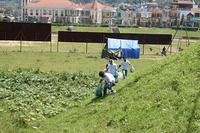
Yealy Green Day sees hundreds of tons of rubbish picked up.
2. Victoria Chau Doc hotel received the Certificate of "Outstanding Contribution to the Mekong Delta sustainable development" by MDEC Kien Giang, on the occasion of the Ceremony announcing the World Biosphere Reserve Zone in Kien Giang. What specific programmes and activities did Victoria undertake that resulted in such an honour?
Victoria Chau Doc Hotel has been honored to receive this certificate, all the more that we were one of two corporates in An Giang Province that were awarded for "Outstanding Contribution to the Mekong Delta sustainable development" along with a few corporates from Mekong Delta. This award acknowledges our efforts to be green, namely the good implementation of environment protection at the hotel and our contributions to sustainable development of the region in general, over the five past years.
3. Victoria Angkor donated a large quantity of bed linens to destitute families from 13 charity organizations established in Siem Reap town. Victoria Can Tho Resort donated three sets of used personal computers to the Doan Thi Diem high school in Can Tho. What other items are needed in Vietnam and Cambodia where Victoria is seeking to help out with, and do you have suggestions how others can help donate on their own?
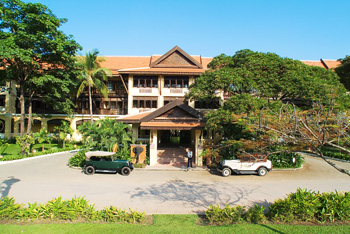
Victoria Angkor Hotel seeks to improve Cambodians' lives.
There is a vast need of pretty much anything in developing countries such as Vietnam and Cambodia, where large parts of the population still live in poverty. We discourage our guests to dole out cash donations or to engage in “orphanage tourism”. In Angkor, we are currently working on new campaigns whose target is to control the use of the donations. Guests can make donations to the hotel. With the money collected, we will buy bicycles for children that live far from their schools or water pumps for people who have no access to clean water. In conjunction with “Friends International” we are about to launch the “Plus One” drive. Guests can opt to add USD 1.00 to their bill: this money will go towards expanding the “ChildSafe” Network to prevent the exploitation of minors. This kind of initiatives aims at providing people in need with means for a better life but also protection for the poorest and resourceless ones. Regarding donations or special operations to raise money, the easiest way remains to contact directly local schools, orphanages, or foundations.
4. What physical improvements are being done to the hotel properties to reduce its carbon footprint?
From the beginning, the group has always set environmentalism as a priority and all our properties have a number of energy-saving measures in place : energy saving bulbs, LED lights, insulated windows/doors, water-saving appliances, etc. Some of our hotels have been equipped with specific devices to save energy and resources. In Phan Thiet, Hoi An and Chau Doc, we have invested in a water treatment system and we use the waste water after treatment for garden watering. In Sapa, we have just finished relocating our gas boiler to be in centralized location. We also work on this issue by planting more trees and grass in our premises, without chemicals or fertilizers when possible. In Can Tho, electricity comes from government supplier (EVN), generator is only stand by. We do not use charcoal: in Hoi An, even for our barbecue, we have the electric grill replace the charcoal grill in the restaurant.
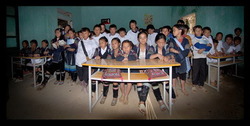
Sapa kids get some help with their homework!
In a general view, all the decisions we make take into account the environmental factor. For instance, we purchase as much as possible locally to limit transport of the goods. In Siem Reap, the hotel has just signed agreements with local cooperatives to supply rice and vegetables, which came in from neighbouring countries in the past. This not only avoids transportation over long distances, it also provides a livelihood to the local communities.
5. How is waste being managed?
All hotels separate waste as far as possible. We sort out the more valuable items (glass, paper, plastic) as well as left-over food (for the local pig farms). Beyond this selection, we cooperate with local environment offices to collect wastes. For instance in Phan Thiet, we contracted to the House and Project department of Binh Thuan to collect the normal solid waste and we are now looking for a company which can treat the toxic waste.
6. Each of Victoria Hotels & Resorts promotes local community trade by having a dedicated boutique at the lobby, and by showcasing the work of art in progress through live demonstration. Can you share how Victoria has helped enrich the lives of the communities this way?
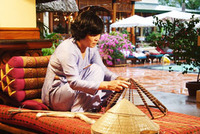
Buying local crafts is a way of helping the poor.
Local handicraft is a major part of the culture in Vietnam and Cambodia, hence the importance of showing it to make the tradition live as long as possible. For a long time, we had a pottery lady at Victoria Phan Thiet, who was one of the last representatives of an art that was disappearing. In general, guests are curious to find out where they can get this kind of craft and search for it with the assistance of the hotel staff. This helps both boost sense of community travel and ensure that this dying art gets a lease of life.
At the Victoria Angkor, apart from agricultural goods, we use many local products, from Cham weaved products to products made out of water hyacinth from the Tonle Sap Lake. These items are often made by marginalized people who have a hard time getting an income otherwise, because of lack of education, or because they are the victims of landmines. Employing these people gives them a chance to make a living, but also to become confident thanks to the guests who acknowledge their good work and quality of their craft by buying them. Most important, it allows them to stay off the streets to look for hand-outs.

